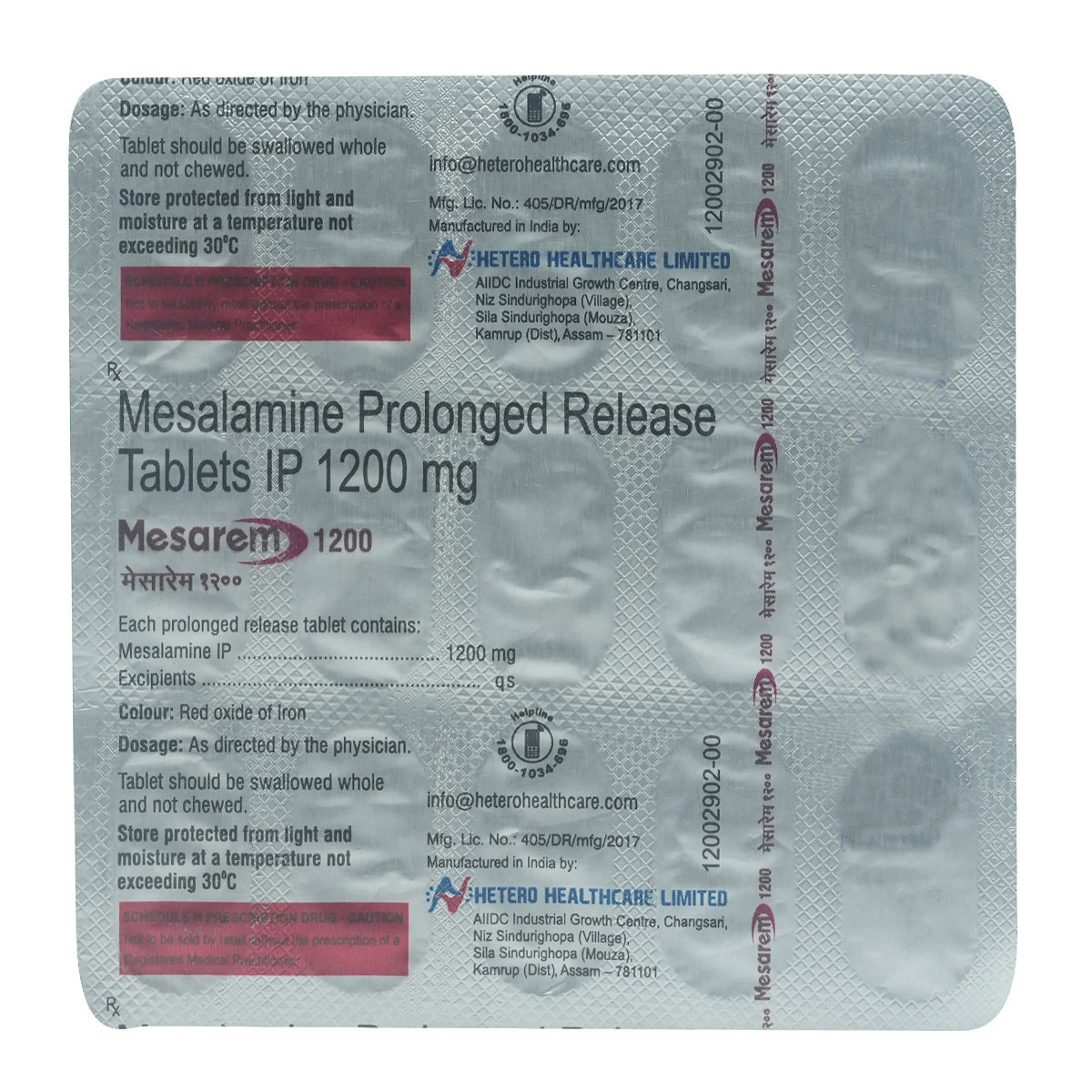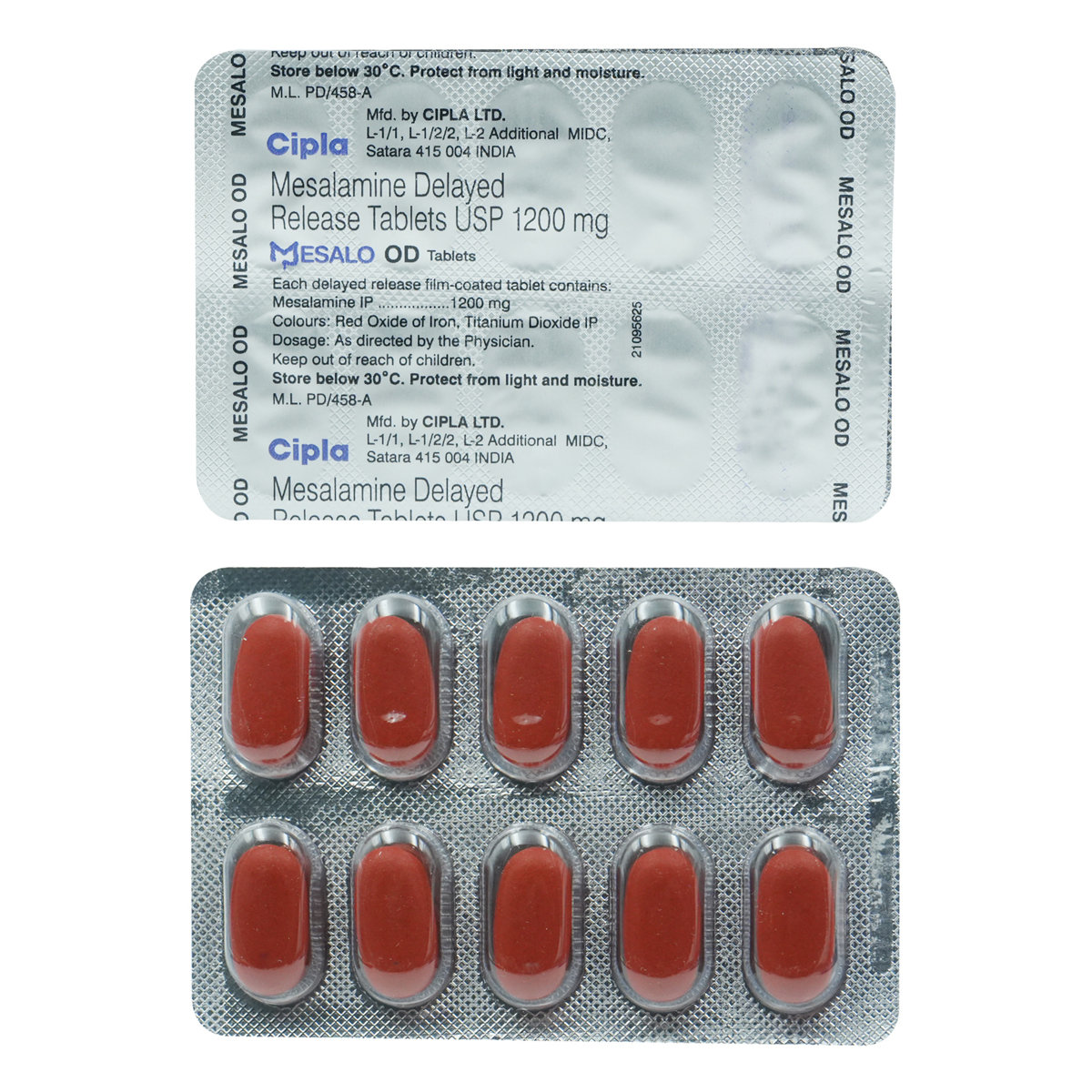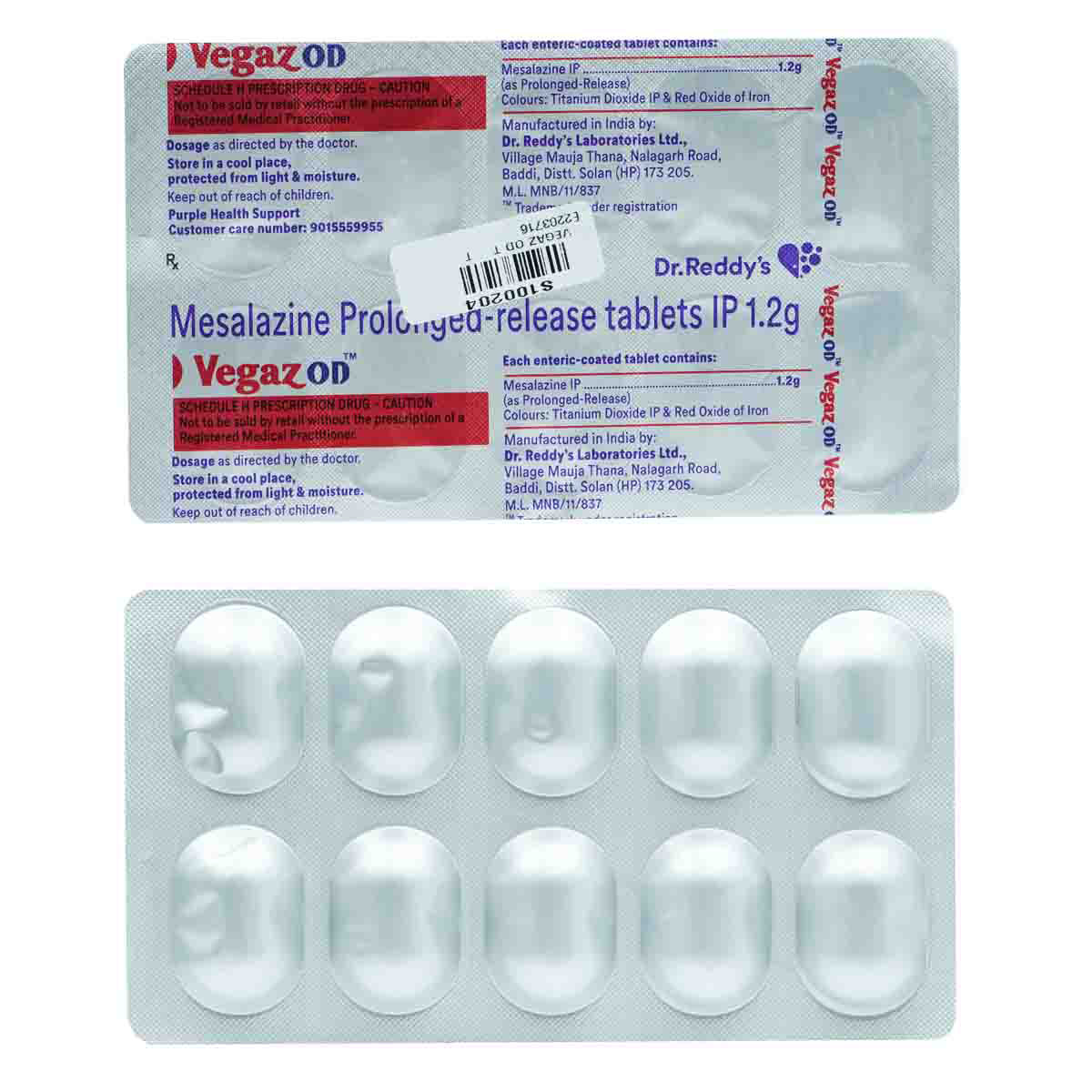Mesalenz 1.2g Tablet DR
MRP ₹280
(Inclusive of all Taxes)
₹42.0 Cashback (15%)
Provide Delivery Location
Online payment accepted
 Prescription drug
Prescription drugWhats That
Composition :
Manufacturer/Marketer :
Consume Type :
Return Policy :
About Mesalenz 1.2g Tablet DR
Mesalenz 1.2g Tablet DR belongs to a class of drugs called 'anti-inflammatory drugs used to treat ulcerative colitis and Crohn’s disease. Ulcerative colitis is a type of chronic inflammatory bowel disease that causes inflammation of the large intestine lining (colon). It produces ulcers on the colon's lining, which may cause bleeding and discharge of pus and mucus.
Mesalenz 1.2g Tablet DR contains Mesalazine, which works by inhibiting the production of certain chemical substances, such as prostaglandins, that cause pain and swelling. Thereby, it reduces inflammation (swelling) in the intestines and provides relief from symptoms such as stomach pain or bleeding.
Take Mesalenz 1.2g Tablet DR as prescribed. You are advised to use Mesalenz 1.2g Tablet DR for as long as your doctor has recommended it for you based on your medical condition. In some cases, you may experience diarrhoea, stomach pain, headache, nausea, vomiting or flatulence (gas). Most of these side effects of Mesalenz 1.2g Tablet DR do not require medical attention and gradually resolve over time. However, if the side effects persist or worsen, please consult your doctor.
Avoid taking Mesalenz 1.2g Tablet DR if you are allergic to Mesalazine or any other medicines. Mesalenz 1.2g Tablet DR should be used with caution in the elderly. If you are pregnant or breastfeeding, please inform your doctor before taking Mesalenz 1.2g Tablet DR. Mesalazine tablet is not recommended for children below two years, and granules are not recommended for children below six years. However, Mesalenz 1.2g Tablet DR should be given to children only if advised by a doctor. Avoid taking Mesalenz 1.2g Tablet DR if you have severe kidney failure. If you have stomach pain or cramps, severe headache, fever or rash, stop taking Mesalenz 1.2g Tablet DR immediately and consult a doctor.
Uses of Mesalenz 1.2g Tablet DR
Directions for Use
Key Benefits
Mesalenz 1.2g Tablet DR contains Mesalazine, an anti-inflammatory drug used in the treatment of ulcerative colitis and Crohn’s disease. It works by inhibiting the production of certain chemical substances, such as prostaglandins, that cause pain and swelling. Thereby helping in reducing inflammation (redness and swelling) in the intestines and providing relief from symptoms such as stomach pain or bleeding. Also, Mesalenz 1.2g Tablet DR may prevent further episodes of ulcerative colitis.
Storage
Drug Warnings
If you are allergic to Mesalazine or any other medicines, please tell your doctor. Mesalenz 1.2g Tablet DR should be used with caution in the elderly. If you are pregnant or breastfeeding, please inform your doctor before taking Mesalenz 1.2g Tablet DR. Mesalazine tablet is not recommended for children below two years, and granules are not recommended for children below six years. However, Mesalenz 1.2g Tablet DR should be given to children only if advised by a doctor. Avoid taking Mesalenz 1.2g Tablet DR if you have severe kidney failure. Severe skin reactions such as toxic epidermal necrolysis (skin peeling and blistering) or Stevens-Johnson syndrome (a painful rash that spreads and blisters) can occur in some patients taking Mesalenz 1.2g Tablet DR. Therefore, if you notice any skin reactions while taking Mesalenz 1.2g Tablet DR, please consult a doctor immediately. If you have stomach pain or cramps, severe headache, fever or rash, stop taking Mesalenz 1.2g Tablet DR immediately and consult a doctor. Avoid taking Mesalenz 1.2g Tablet DR if you have had blood abnormalities or kidney problems while taking other medicines such as Sulphasalazine.
Diet & Lifestyle Advise
- Maintain a low-fat diet and eat foods rich in vitamin C, such as bell peppers, spinach, parsley and berries, which help in healing faster.
- Include olive oil and omega-3 fatty acids.
- Eat more fibre-rich foods such as fruits and vegetables.
- Limit dairy intake as your body may develop difficulty digesting certain dairy products when you are affected with Crohn’s disease, which leads to stomach cramps, diarrhoea or stomach upset.
- Drink plenty of water to prevent dehydration.
Side Effects of Mesalenz 1.2g Tablet DR
- Diarrhoea
- Stomach pain
- Headache
- Nausea
- Vomiting
- Flatulence (gas)
Habit Forming
Therapeutic Class
All Substitutes & Brand Comparisons
RX
Rowasa OD 1200 Tablet 10's
Abbott India Ltd
₹281
(₹25.29 per unit)
RX
Out of StockMesafine 1.2 mg Tablet 10's
Solitaire Pharmacia Pvt Ltd
₹285
(₹25.65 per unit)
1% COSTLIERRX
Medasa 1.2 gm Tablet 15's
Enactis Healthcare Pvt Ltd
₹430
(₹25.8 per unit)
2% COSTLIER
Author Details
We provide you with authentic, trustworthy and relevant information
FAQs
Drug-Drug Interactions Checker List
- LACTULOSE
- ASPIRIN
- IBUPROFEN
- AZATHIOPRINE
- THIOGUANINE
- MERCAPTOPURINE
Special Advise
- Blood and urine tests are recommended before and during the treatment with Mesalenz 1.2g Tablet DR to monitor the functioning of kidney, liver and blood.
Disease/Condition Glossary
Ulcerative colitis: It is a type of chronic inflammatory bowel disease that causes inflammation of the lining of the large intestine (colon) and produces ulcers on the lining of the colon, which may cause bleeding and discharge of pus and mucus. The common symptoms include bloody stools, stomach pain, rectal pain, diarrhoea, fever or weight loss. Additionally, it may cause other problems such as joint pain or swelling, mouth sores, skin problems, decreased appetite or nausea. The factors involved in causing ulcerative colitis include immune disorders and environmental factors like viruses, bacteria or antigens, which may trigger the immune system and genes inherited from the parent.
Crohn’s disease: It is a type of chronic inflammatory bowel disease that can affect any part of the gastrointestinal tract, from mouth to anus. But mostly occurs in the small intestine and large intestine. The symptoms include blood in stools, stomach cramps, tiredness, diarrhoea, fever, weight loss or loss of appetite.

Have a query?
Alcohol
Safe if prescribed
Interaction of alcohol with Mesalenz 1.2g Tablet DR is unknown. If you have concerns regarding this, please discuss it with your doctor before taking Mesalenz 1.2g Tablet DR.
Pregnancy
Consult your doctor
Mesalenz 1.2g Tablet DR is a Category B pregnancy drug and is given to pregnant women only if the doctor thinks the benefits outweigh the risks. Please consult your doctor if you are pregnant or planning for pregnancy before taking Mesalenz 1.2g Tablet DR.
Breast Feeding
Consult your doctor
Mesalenz 1.2g Tablet DR should not be taken by breastfeeding mothers unless advised by the doctor. Granules form of Mesalazine may cause allergic reactions such as diarrhoea in newborn babies after breastfeeding. If this happens, discontinue breastfeeding.
Driving
Safe if prescribed
Mesalenz 1.2g Tablet DR usually does not affect your ability to drive or operate machinery.
Liver
Consult your doctor
Please consult your doctor, if you have liver problems before using Mesalenz 1.2g Tablet DR.
Kidney
Consult your doctor
Mesalenz 1.2g Tablet DR should be used with extreme caution in patients with mild to moderate kidney impairment. Avoid taking Mesalenz 1.2g Tablet DR if you have severe kidney impairment.
Children
Safe if prescribed
Mesalazine tablet is not recommended for children below two years, and granules are not recommended for children below six years. However, Mesalenz 1.2g Tablet DR should be given to children only if recommended by a doctor.














